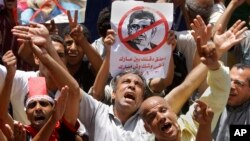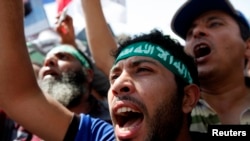CAIRO —
Backers and opponents of Egyptian President Mohamed Morsi have traded gunfire and thrown firecrackers at each other during brutal street fighting in Alexandria.
Riot police moved in with armored vehicles and tear gas, but not before the offices of Morsi's political party were set on fire.
Authorities say two people have been killed, including a U.S. citizen stabbed to death while taking pictures of the riots. The State Department has issued a travel warning for Egypt, telling Americas to put off non-essential travel there. Some embassy workers and their families will be evacuated.
Protesters also are gathering in Cairo's Tahrir Square, waving Egyptian flags and calling for Morsi's departure. They are preparing for a massive anti-government rally Sunday, the one-year anniversary of Morsi's presidency.
The opposition accuses Morsi and his Muslim Brotherhood movement of trying to undermine secular rights and not living up to the 2011 uprising that forced ex-president Hosni Mubarak to flee.
A few thousand Morsi supporters gathered in front of a mosque in the outlying Cairo district of Nasr City during Friday prayers. Many carried banners proclaiming support for the president and the crowd broke into periodic chants of “Islamic rule, Islamic rule.”
At the same time, anti-Morsi protesters chanted slogans calling for the president to resign, marching from at least three Cairo districts towards the city's iconic Tahrir Square.
In Egypt's second largest city, Alexandria, still more anti-government protesters turned out in force, fighting with guns and firecrackers. At least one person was killed while the offices of Morsi's political party were set on fire.
Riot police moved in with armored vehicles to break up the clashes, firing tear gas in an effort to clear the streets of protesters demanding that the Islamist Muslim Brotherhood group stop meddling in politics.
Battles between Morsi supporters and opponents in the provincial regions of Fayyoum, Sharqiya and Dhekeliya left at least three dead and 300 wounded in the last 48 hours. At least one Muslim Brotherhood political office was attacked and burned, near Cairo.
A new opposition movement calling itself “tamarud” or “rebellion” claims to have gathered 15 million signatures asking the president to step down. There is worry that young tamarud members will clash with the president's supporters who say that he was “democratically” elected and must remain.
Said Sadek, who teaches political sociology at the American University in Cairo, said that the situation in the country is “explosive.” But the fundamental conflict is economic.
"Political Islam reflects class struggle in the country. It's not religious," he said. "They are using religious terminology to cover up for socio-economic differences and rivalry and competition. It's a pure political conflict, that [Morsi] is incompetent, that he doesn't deliver, he doesn't know how to manage the country, he is dividing the country, he is not delivering the objectives of the revolution."
Societal conflict in Egypt will not be resolved by street protests, Middle East scholar Fouad Ajami of the Hoover Institution said, adding that little will come out of the this cycle of protests:
"It's an essential political stalemate and the protests will not offer deliverance from that kind of stalemate, because the regime has its crowds," said Ajami. "The opposition has its crowds, and let us not forget that Morsi has on his side that very elusive but nevertheless very powerful prop in a situation like that: legitimacy.....The protests will tell us of the unease in the country and of its divisions and the morning after the protests we shall return to the same stalemate."
Egypt's army officials told cadets recently that the military would only intervene in the country's political conflict if violence were to break out in the streets.
Riot police moved in with armored vehicles and tear gas, but not before the offices of Morsi's political party were set on fire.
Authorities say two people have been killed, including a U.S. citizen stabbed to death while taking pictures of the riots. The State Department has issued a travel warning for Egypt, telling Americas to put off non-essential travel there. Some embassy workers and their families will be evacuated.
Protesters also are gathering in Cairo's Tahrir Square, waving Egyptian flags and calling for Morsi's departure. They are preparing for a massive anti-government rally Sunday, the one-year anniversary of Morsi's presidency.
The opposition accuses Morsi and his Muslim Brotherhood movement of trying to undermine secular rights and not living up to the 2011 uprising that forced ex-president Hosni Mubarak to flee.
A few thousand Morsi supporters gathered in front of a mosque in the outlying Cairo district of Nasr City during Friday prayers. Many carried banners proclaiming support for the president and the crowd broke into periodic chants of “Islamic rule, Islamic rule.”
At the same time, anti-Morsi protesters chanted slogans calling for the president to resign, marching from at least three Cairo districts towards the city's iconic Tahrir Square.
In Egypt's second largest city, Alexandria, still more anti-government protesters turned out in force, fighting with guns and firecrackers. At least one person was killed while the offices of Morsi's political party were set on fire.
Riot police moved in with armored vehicles to break up the clashes, firing tear gas in an effort to clear the streets of protesters demanding that the Islamist Muslim Brotherhood group stop meddling in politics.
Battles between Morsi supporters and opponents in the provincial regions of Fayyoum, Sharqiya and Dhekeliya left at least three dead and 300 wounded in the last 48 hours. At least one Muslim Brotherhood political office was attacked and burned, near Cairo.
A new opposition movement calling itself “tamarud” or “rebellion” claims to have gathered 15 million signatures asking the president to step down. There is worry that young tamarud members will clash with the president's supporters who say that he was “democratically” elected and must remain.
Said Sadek, who teaches political sociology at the American University in Cairo, said that the situation in the country is “explosive.” But the fundamental conflict is economic.
"Political Islam reflects class struggle in the country. It's not religious," he said. "They are using religious terminology to cover up for socio-economic differences and rivalry and competition. It's a pure political conflict, that [Morsi] is incompetent, that he doesn't deliver, he doesn't know how to manage the country, he is dividing the country, he is not delivering the objectives of the revolution."
Societal conflict in Egypt will not be resolved by street protests, Middle East scholar Fouad Ajami of the Hoover Institution said, adding that little will come out of the this cycle of protests:
"It's an essential political stalemate and the protests will not offer deliverance from that kind of stalemate, because the regime has its crowds," said Ajami. "The opposition has its crowds, and let us not forget that Morsi has on his side that very elusive but nevertheless very powerful prop in a situation like that: legitimacy.....The protests will tell us of the unease in the country and of its divisions and the morning after the protests we shall return to the same stalemate."
Egypt's army officials told cadets recently that the military would only intervene in the country's political conflict if violence were to break out in the streets.






